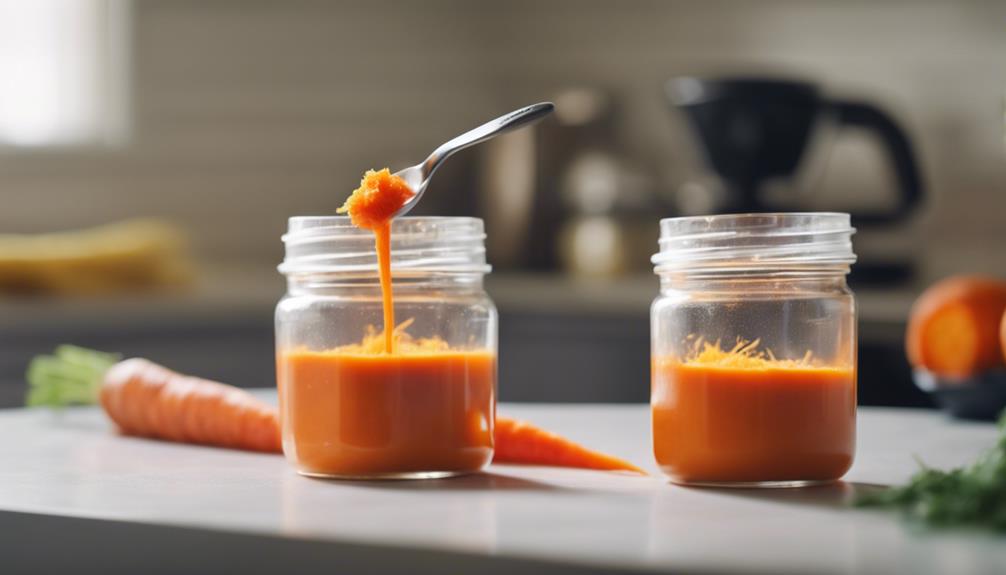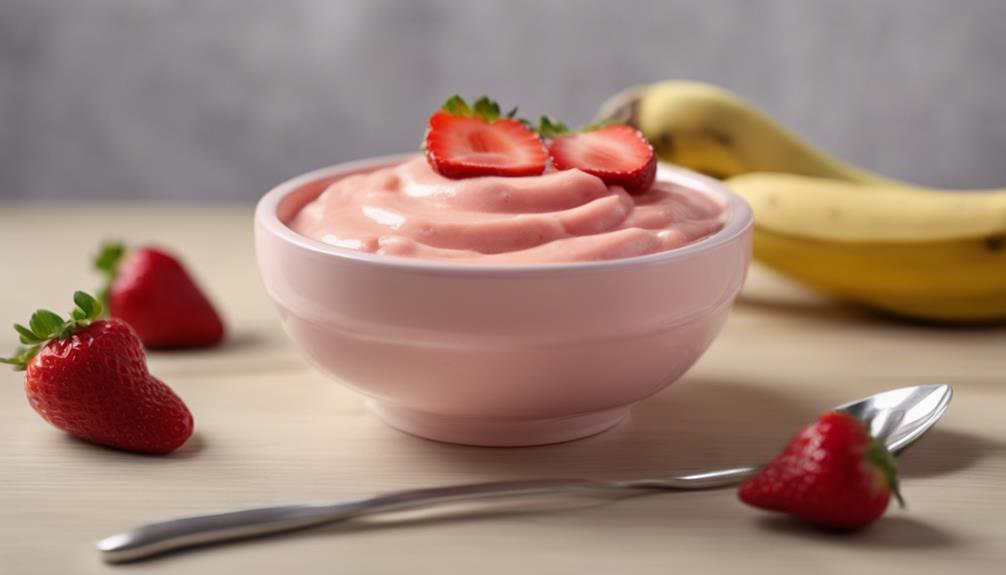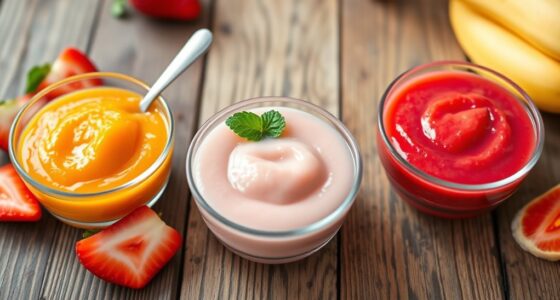Get your baby’s taste buds excited with a simple and nutritious carrot puree! Choose fresh or frozen organic carrots for optimal nutrition. Rinse, peel, and chop the carrots into small pieces, then boil or steam until tender. Blend with water and a dash of nutmeg for the perfect texture. Carrots are rich in beta-carotene for a healthy immune system and eyesight. Remember, homemade purees are fresher and provide more nutrients. But wait, there’s more to learn about this delightful recipe!
Key Takeaways
- Use fresh organic carrots for optimal flavor and nutrition.
- Peel carrots before cooking to remove any residue.
- Experiment with spices like nutmeg for added flavor.
- Blend cooked carrots for a smooth texture.
- Portion and store puree for convenient feeding.
Recipe Preparation and Ingredients
When preparing the Carrot Baby Puree, gather fresh or frozen carrots and a touch of nutmeg for added flavor. Opting for organic carrots guarantees a higher nutritional value for your little one.
Begin by washing and peeling the carrots, then chop them into small pieces for easier blending. Boil or steam the carrots until they're soft and can be easily mashed with a fork. Once tender, transfer the carrots to a blender or food processor, adding a splash of water to achieve the desired consistency. A sprinkle of nutmeg will elevate the flavor profile, making the puree more appealing to your baby's palate.
Avoid store-bought baby food, as homemade purees provide fresher and more nutritious options for your baby. By making your own baby food, you have control over the ingredients and can make sure that no preservatives or additives are included.
Introducing solids like carrot puree early on can help develop your baby's taste for healthy foods while providing essential vitamins and minerals for their growth and development.
Health Benefits and Nutritional Value
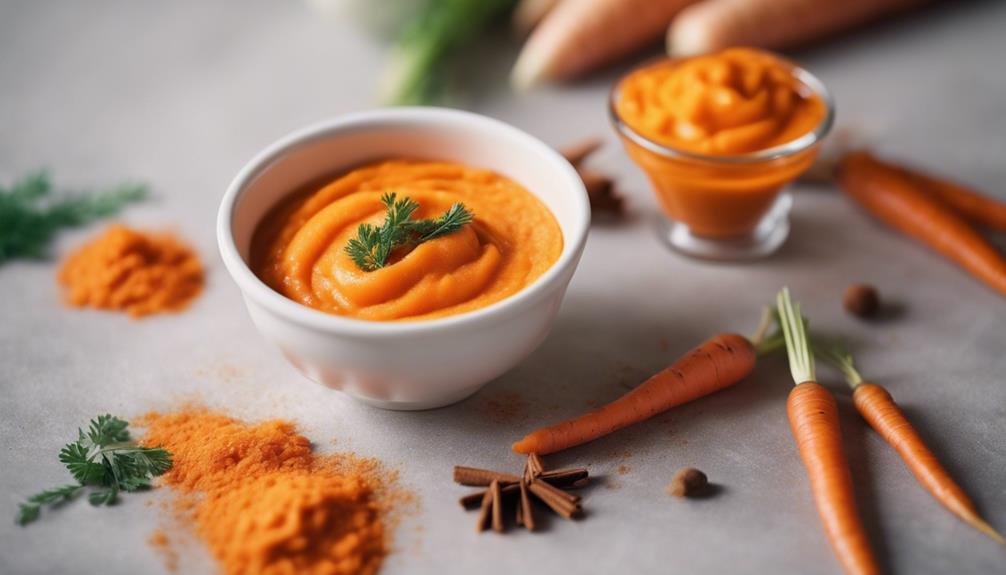
Carrots are a powerhouse of nutrients, offering a range of health benefits for your little one.
Beta-carotene in carrots supports healthy eyes and boosts immune function, while antioxidants help strengthen their immunity.
Additionally, carrots provide essential vitamins like vitamin K for blood clotting and calcium for strong bones.
Nutrient-rich Carrots
Rich in essential nutrients and antioxidants, nutrient-rich carrots offer a range of health benefits for both you and your baby.
Carrots are a fantastic choice for your baby's first foods due to their high vitamin A content, essential for good vision and overall eye health.
Making homemade carrot puree isn't only easy but also guarantees your baby gets all the crucial nutrients without any added preservatives or sugars.
You can easily store any excess puree by freezing it in convenient portions for later use, maintaining its freshness and nutritional value.
Apart from vitamin A, carrots are packed with antioxidants that help boost the immune system and protect cells from damage, promoting overall well-being.
Additionally, the fiber in carrots aids in digestion and supports a healthy gut.
Health Benefits
Boost your baby's health and development with the nutrient-rich benefits of homemade carrot puree.
Carrots are a powerhouse of nutrients, containing beta-carotene that converts into vitamin A, essential for eye health and immune function. Their high antioxidant content, like vitamin C, not only boosts immunity but also fights inflammation, keeping your little one healthy.
Additionally, the fiber in carrots supports digestion, while vitamin K aids in blood clotting and calcium strengthens bones. These benefits make carrots an ideal choice for baby food, offering a well-rounded source of essential nutrients vital for growth and development.
By introducing carrots early on, you can help establish healthy eating habits for your infant, thanks to their digestibility and rich nutrient profile.
Vitamin Content
Enhance your baby's health and development by introducing the abundant nutrient content found in vitamin-rich carrot puree. Carrots are packed with essential vitamins and minerals important for your little one's well-being.
Vitamin A in carrots is essential for eye health and vision, while antioxidants like vitamin C help boost the immune system and protect cells from damage. The fiber in carrots aids in digestion, promoting a healthy gut for your baby.
Additionally, vitamin K supports blood clotting, and calcium contributes to bone strength and development, ensuring your baby grows healthy and strong. By incorporating carrot puree into your baby's diet, you provide a powerhouse of nutrients necessary for their growth and development.
Cooking Methods and Tools

When making carrot puree for your baby, consider different cooking methods like steaming, roasting, or boiling to bring out unique flavors and textures.
Essential tools such as a blender, saucepan, knives, veggie peeler, and storage containers will make the process smoother.
Cooking Methods
To prepare carrot puree for your baby, consider steaming the carrots for 10-12 minutes until tender, as this is a recommended cooking method. Steaming helps maintain the nutrients in the carrots better than other methods.
If you prefer a different flavor profile, you can also roast the carrots in the oven or boil them on the stovetop before blending them into a smooth puree.
Achieve the desired consistency by blending the cooked carrots for at least 2 minutes on high speed in a blender. This guarantees a silky and easy-to-swallow texture for your little one.
Essential Tools
Consider equipping yourself with essential tools like a blender, saucepan, knives, veggie peeler, and storage containers to prepare nutritious carrot puree for your baby. These tools will help you create a smooth and delicious puree that your little one will love. Here are some key items to have on hand:
- Blender: Perfect for achieving a creamy consistency in your carrot puree.
- Saucepan: Ideal for cooking the carrots until tender before blending.
- Knives: Essential for chopping the carrots into manageable pieces.
- Veggie Peeler: Handy for peeling the carrots before cooking.
- Storage Containers: Great for keeping any leftover puree fresh for later meals.
Incorporating these tools into your cooking routine ensures that you retain the nutrients in the carrots while creating a tasty puree for your baby.
Remember, having the proper tools, like a steamer basket for maintaining texture, is crucial to a successful and nutritious carrot puree.
Happy cooking!
Storage and Feeding Tips

Store your Carrot Baby Puree in the fridge for up to 4 days or freeze it for up to 4 months for best freshness and convenience.
When freezing, consider using frozen cubes for easy portioning. Remember not to overfill the containers to avoid any mishaps when defrosting. Labeling your containers with the preparation dates and contents will help you stay organized in the freezer.
To introduce variety, try mixing the homemade Carrot Puree with other foods like apples, sweet potato, or multigrain baby cereal. As your little one starts solid foods, you can also blend the Carrot Puree with breast milk for added nutrition.
When thawing frozen cubes, do so gradually in the refrigerator and aim to consume them within 48 hours for optimal taste.
Additional Tips and Variations
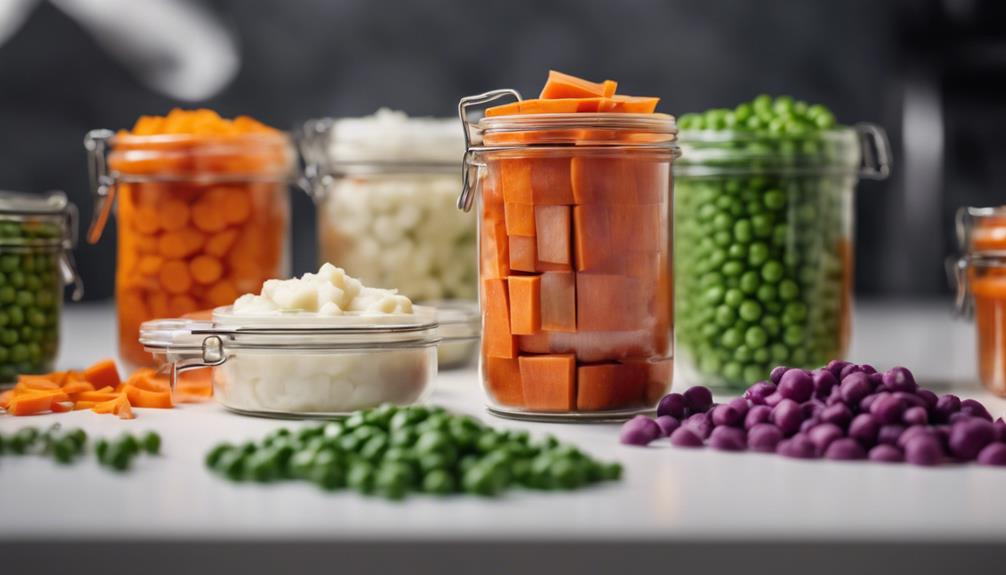
Experiment with different spices and combinations to enhance the flavors and nutritional value of your baby's carrot puree. Adding a pinch of cinnamon or a hint of ginger can launch a simple puree into a delightful treat for your little one. Try mixing the carrot puree with fruits like apples or pears to introduce exciting new tastes and textures early on.
For a more varied diet, blend the carrot puree with vegetables such as sweet potatoes or peas to provide a spectrum of nutrients. Don't be afraid to roast the carrots before pureeing them to add a depth of flavor to the dish. Remember to use fresh ingredients for the best taste and nutritional benefits.
As you commence on this journey of baby food recipes, gradually introduce new food combinations to expand your baby's palate and make mealtime an adventure. Engaging with the community can also provide valuable feedback and tips on different flavor combinations and feeding strategies, making the experience even more enriching.
Benefits of Homemade Baby Food and Carrot Nutrition
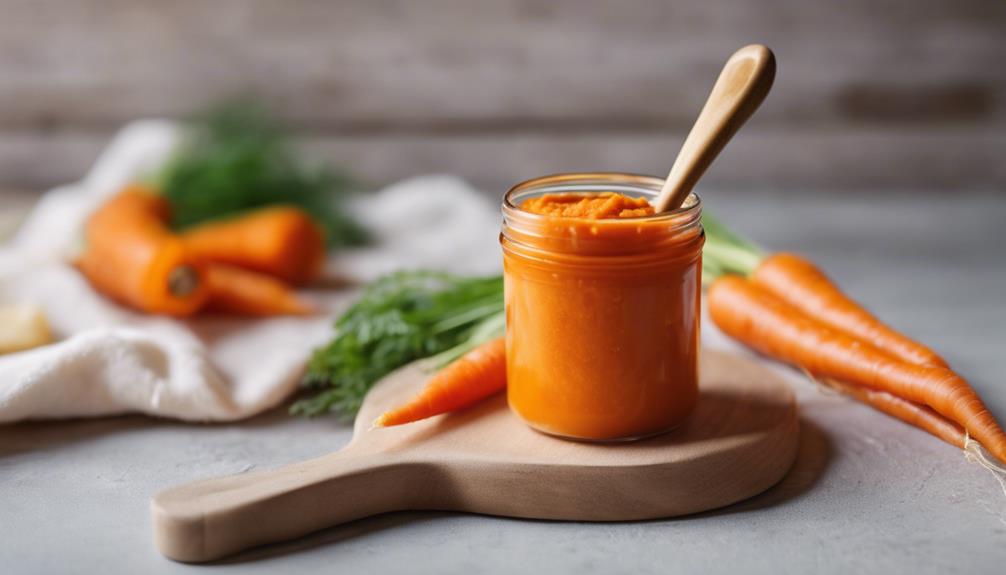
To promote excellent nutrition for your infant, homemade baby food offers fresh, nutrient-rich options with control over ingredients.
When it comes to carrot nutrition, these vibrant veggies are packed with essential nutrients like beta-carotene, vitamin A, vitamin C, iron, calcium, and fiber, important for your baby's growth and development.
Introducing carrots early on can help establish healthy eating habits, potentially reducing picky eating tendencies in the future. Additionally, carrots support eye health, boost the immune system, and are generally well-tolerated by most babies due to their low allergy risk.
Opting for organic carrots for homemade baby food ensures that your little one is getting high-quality ingredients while minimizing pesticide exposure.
Selection and Preparation of Carrots

Consider selecting fresh, organic whole carrots for peak nutrient content and flavor when preparing homemade baby food.
When it comes to the selection and preparation of carrots, here are some key points to keep in mind:
- Peeling your carrots before making puree not only guarantees a cleaner end product but also helps eliminate any potential pesticide residue.
- While baby carrots offer convenience, opting for whole carrots can enhance the depth of flavor in your homemade puree.
- Choosing organic carrots is essential for reducing pesticide exposure, especially important when making baby food.
- Don't overlook the importance of removing the peel from your carrots; it can greatly improve the taste by getting rid of any bitterness or earthy notes.
- Remember, the quality of your ingredients, like fresh organic carrots, plays a significant role in the overall flavor and nutrient profile of your baby's food.
Frequently Asked Questions
Is Homemade Carrot Puree Safe for Babies?
Homemade carrot puree is safe for your baby when made with fresh, organic carrots. Cook and blend it thoroughly for easy digestion. Avoid adding salt, sugar, or honey. Store it properly and consult with a pediatrician for guidance.
Can Babies Eat Carrot Puree Everyday?
You can feed your baby carrot puree every day. It's packed with vitamins and fiber, offering essential nutrients. Remember to introduce new foods gradually to watch for allergies. Mixing it up with other ingredients adds variety to their diet.
How to Make Carrot Puree for Baby Without Blender?
To make carrot puree for your baby without a blender, simply mash cooked carrots with a fork or potato masher until smooth. This method is quick, easy, and allows you to control the texture.
Is Carrot Puree Easy to Digest?
Absolutely, carrot puree is like a gentle breeze for your baby's tummy. Its smooth texture and high fiber content make it easy to digest, promoting healthy digestion and regular bowel movements. Your little one will thank you!
Conclusion
So, there you have it – a simple and nutritious carrot puree recipe for your little one! With all the health benefits and easy preparation, this homemade baby food is a winner.
Don't worry about store-bought options when you can whip up this delicious dish in no time. Your baby will thank you for the tasty treat, and you'll feel like a superhero parent for providing such a wholesome meal.
Happy cooking!

